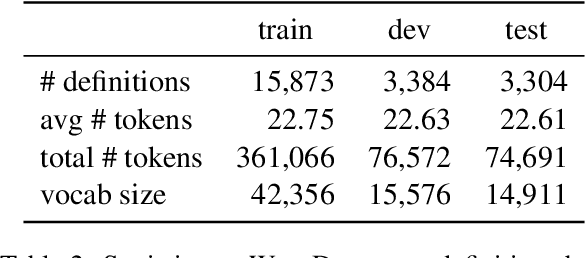Sumit Asthana
Evaluating LLMs for Targeted Concept Simplification forDomain-Specific Texts
Oct 28, 2024



Abstract:One useful application of NLP models is to support people in reading complex text from unfamiliar domains (e.g., scientific articles). Simplifying the entire text makes it understandable but sometimes removes important details. On the contrary, helping adult readers understand difficult concepts in context can enhance their vocabulary and knowledge. In a preliminary human study, we first identify that lack of context and unfamiliarity with difficult concepts is a major reason for adult readers' difficulty with domain-specific text. We then introduce "targeted concept simplification," a simplification task for rewriting text to help readers comprehend text containing unfamiliar concepts. We also introduce WikiDomains, a new dataset of 22k definitions from 13 academic domains paired with a difficult concept within each definition. We benchmark the performance of open-source and commercial LLMs and a simple dictionary baseline on this task across human judgments of ease of understanding and meaning preservation. Interestingly, our human judges preferred explanations about the difficult concept more than simplification of the concept phrase. Further, no single model achieved superior performance across all quality dimensions, and automated metrics also show low correlations with human evaluations of concept simplification ($\sim0.2$), opening up rich avenues for research on personalized human reading comprehension support.
Summaries, Highlights, and Action items: Design, implementation and evaluation of an LLM-powered meeting recap system
Jul 28, 2023



Abstract:Meetings play a critical infrastructural role in the coordination of work. In recent years, due to shift to hybrid and remote work, more meetings are moving to online Computer Mediated Spaces. This has led to new problems (e.g. more time spent in less engaging meetings) and new opportunities (e.g. automated transcription/captioning and recap support). Recent advances in large language models (LLMs) for dialog summarization have the potential to improve the experience of meetings by reducing individuals' meeting load and increasing the clarity and alignment of meeting outputs. Despite this potential, they face technological limitation due to long transcripts and inability to capture diverse recap needs based on user's context. To address these gaps, we design, implement and evaluate in-context a meeting recap system. We first conceptualize two salient recap representations -- important highlights, and a structured, hierarchical minutes view. We develop a system to operationalize the representations with dialogue summarization as its building blocks. Finally, we evaluate the effectiveness of the system with seven users in the context of their work meetings. Our findings show promise in using LLM-based dialogue summarization for meeting recap and the need for both representations in different contexts. However, we find that LLM-based recap still lacks an understanding of whats personally relevant to participants, can miss important details, and mis-attributions can be detrimental to group dynamics. We identify collaboration opportunities such as a shared recap document that a high quality recap enables. We report on implications for designing AI systems to partner with users to learn and improve from natural interactions to overcome the limitations related to personal relevance and summarization quality.
 Add to Chrome
Add to Chrome Add to Firefox
Add to Firefox Add to Edge
Add to Edge